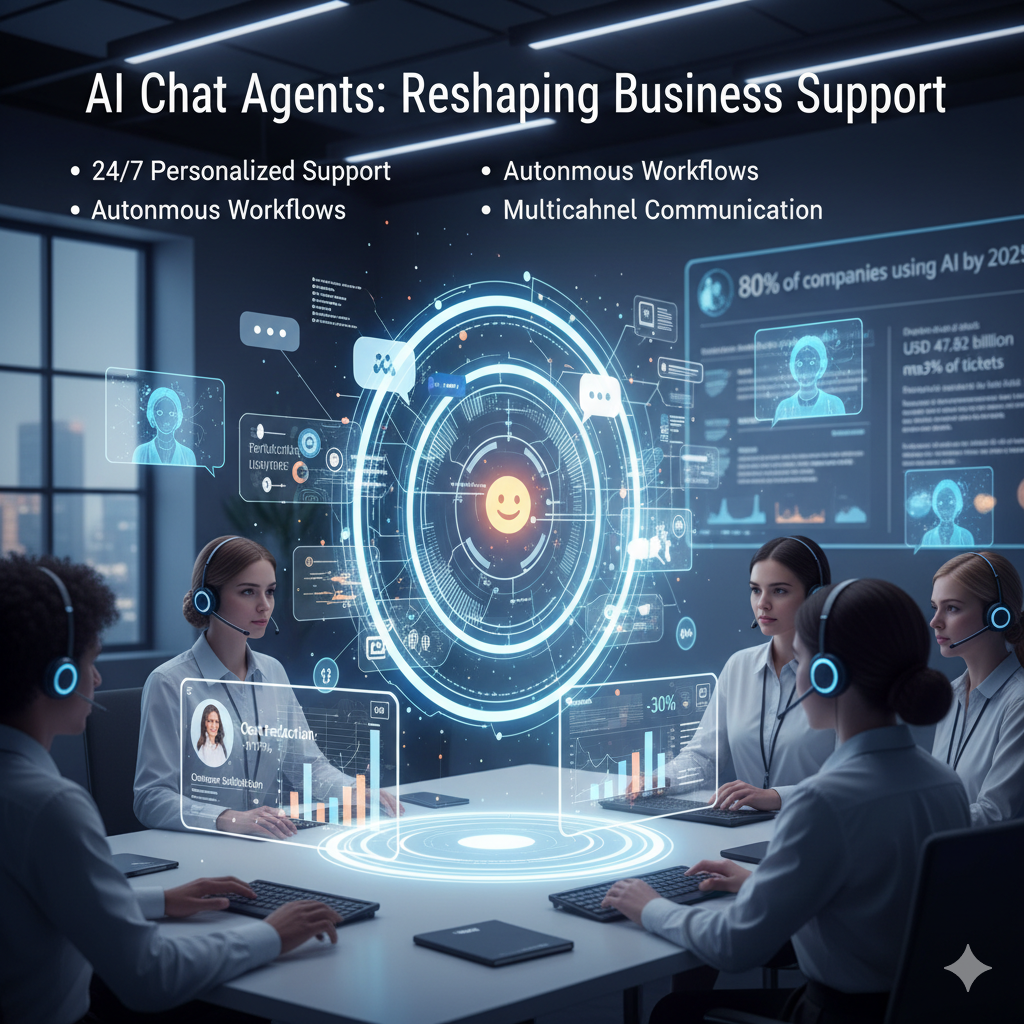The Future of AI Chat Agents in Business Support: What Every Company Needs to Know
October 16, 2025 - Reading time: 14 minutes

In an era when customers demand instant, personalized, 24/7 support, AI chat agents are no longer a “nice to have” — they are rapidly becoming business-critical. Below is a forward-looking view, supported by data and real examples, of how AI chat agents are reshaping business support. Use this as a foundation for your company’s blog or thought leadership content.
Why AI Chat Agents Matter (Today, Not Just Tomorrow)
Here are some powerful statistics to lead with:
-
80% of companies are using or planning to use chatbots/AI for customer service by 2025. Plivo+1
-
The AI customer service market is projected to reach ≈ USD 47.82 billion by 2030. fullview.io
-
Businesses deploying AI in service report 17% higher customer satisfaction (among “mature adopters”). IBM
-
AI chatbots can cut support costs by up to 30%. Language IO+1
-
Real-world case: AI agents deflected 43% of support tickets in one deployment; self-service reduced overall ticket volume by half. VKTR.com
-
In e-commerce, companies that added AI chat assistants saw an average 20% boost in order value in the first week. Big Sur AI
These numbers tell a story: AI chat agents are already delivering real ROI, cost savings, and improved customer experience. The future is about amplifying those gains and overcoming existing limitations.
Emerging Trends & What’s Coming Next
Here are the directions in which AI chat agents are evolving, along with examples and considerations:
-
Agentic / Autonomous AI Agents
Newer systems go beyond script-based chatbots — they actively reason, plan, call external APIs/tools, and manage multi-step workflows. A recent case study (Minerva CQ) shows how agentic AI in voice support can help with real-time context, intent detection, and adaptive conversation tracking. arXiv -
Deep Integration Across Enterprise Systems
Future chat agents will plug into CRMs, billing, inventory, internal knowledge bases, and analytics systems—allowing them not just to respond, but to act. For example, instead of just answering “what is my order status,” the agent might offer to expedite shipping or modify the order directly. -
Proactive & Predictive Support
Instead of waiting for a customer to ask a question, AI agents will anticipate needs. E.g. “Your warranty is expiring in 30 days — would you like me to renew it?” or “I noticed a drop in your usage last month — want help with onboarding?” This shift is essential to move from reactive to preventative support. -
Multimodal & Omnichannel Conversations
Future agents will handle not just text or voice, but images, video, attachments, and hybrid forms (e.g. “Here’s a photo of the issue”). They’ll maintain context across channels (web chat, mobile, social media, voice) to create seamless experiences. -
Continuous Learning & Self-Improvement
Agents will increasingly adapt from real interactions (both successes and failures), incorporate feedback loops, fine-tune models, and update internal knowledge automatically—making them smarter over time. -
Ethics, Trust, Explainability & Governance
As AI takes on more critical tasks, issues of bias, data privacy, transparency, and oversight become non-negotiable. Companies must embed “AI governance” early: audit trails, fallback to human agents, monitoring metrics, and user consent. -
Hybrid Human + AI Models
For the foreseeable future, the best models will combine AI with human oversight—AI handling high volume routine queries, humans stepping in for edge cases, complex judgments, or emotionally sensitive interactions.
Real Examples & Insights from Industry
That’s all excellent theory—but what do real companies do? Below are illustrative examples:
-
Camping World: After an influx of support calls overwhelmed their contact centers, they deployed AI agents which helped deflect a large share of tickets and reduce waiting times. VKTR.com
-
Minerva CQ / Agentic Support: The case study shows how agentic AI systems can assist agents in real time—detecting context, invoking appropriate workflows, summarizing, and working alongside human agents. arXiv
-
More broadly, generative AI adoption is surging: As of 2024, 71% of organizations report using generative AI in at least one business function (especially in service operations). McKinsey & Company
-
And in the real world, Salesforce’s AI is reported by Marc Benioff to handle customer inquiries with 93% accuracy in certain configurations. Business Insider
These show that real, production-grade systems are not science fiction—they are operational today.
HashPalLabsBlog
Our flagship product is the Sales 360 Platform, a comprehensive, privacy-first solution designed to power sales and marketing for your enterprise, restaurant, grocery store, small business, e-commerce shop, logistics operation, HRMS service, or general service provider, helping your team grow efficiently and securely.
It's also ideal for influencers looking to build and scale their own sales channels or businesses. We offer continuous mentorship and dedicated support to all our clients.
To connect with us visit:https://www.hashpallabs.com